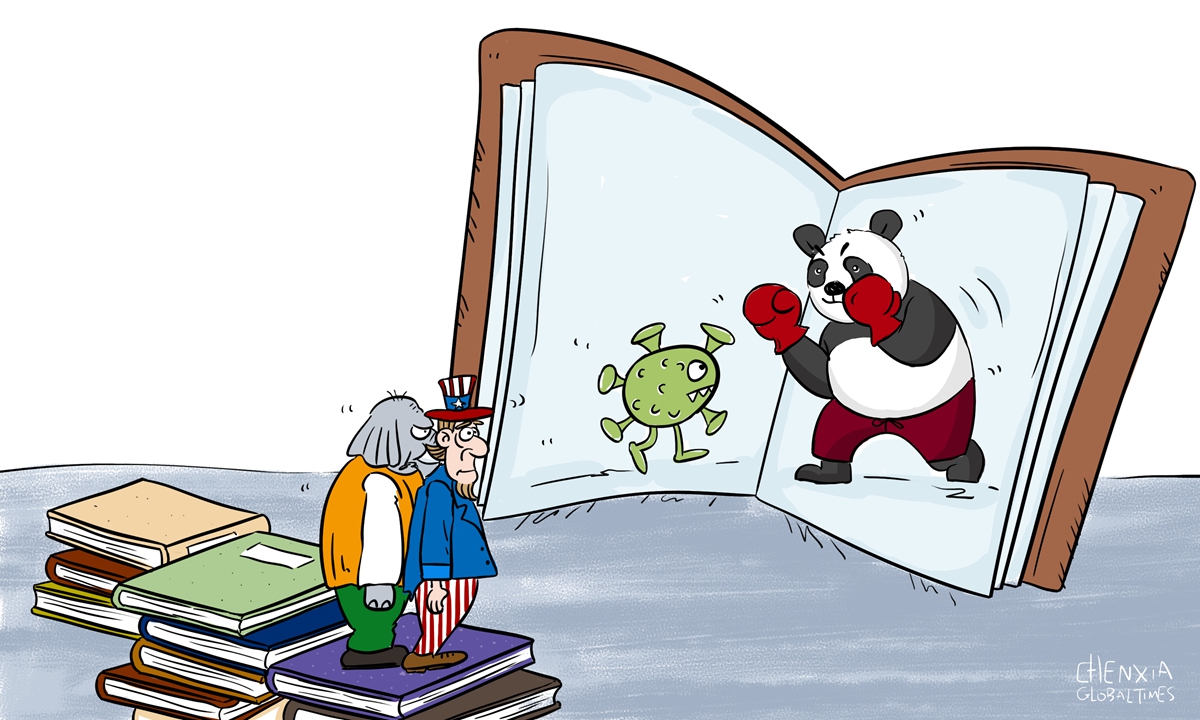COMMENTS / COLUMNISTS
For US and India, it is never too late to learn from Wuhan

Illustration: Chen Xia/GT
A summertime electronic music concert recently held in a Wuhan pool, featuring hundreds of young party-goers reveling, singing and dancing, shoulder-to-shoulder and without wearing facemasks, has amused many across the world. The scene also begrudges many overseas as their countries are still in the midst of battling the novel coronavirus.
A local Wuhan cab driver summarized the city's reasons for success in containing the epidemic as "the government's measures of slapping 76-day strident lockdowns since January 23," otherwise the virus wouldn't have been fended off. "We fought hard and the revel is our payback," the driver announced.
The contrast will be starker in about 10 days' time when tens of thousands of China's schools open their doors to receive students and kindergartens again greet toddlers and children. All the while in the US, the worst-hit country in the world, many teachers are wary of, or refuse to begin, face-to-face courses in schools, due to an unknown number of asymptomatic students.
Not only in Wuhan, but also in Beijing, Shanghai, Shenzhen, Chengdu, Xi'an and throughout the whole of the Chinese mainland, life has already returned to normal. Wuhan, which was the epicenter of the COVID-19 pandemic in January and February, has not reported any new infections since mid-May. If not for the torrential rain seen in June and July, the music and dance festivals would have begun much earlier.
However, some countries remain overwhelmed, with more than 40,000 new cases and hundreds of fatalities per day. For example, the US' total infection count is drawing closer to 6 million and the death toll has exceeded 170,000.
Compared to China's broader success in tackling the public health crisis, some countries, such as the US and India, have done very poorly in preventing and containing the virus. The negligence of the top policymakers and dysfunctional government apparatus have caused a glaringly human loss in those nations.
A government's resolve or willingness to place saving lives before rescuing a stifled economy and achieving re-election is being tested. The COVID-19 pandemic has been a litmus test of different governments' competencies in grappling with a crisis of this magnitude. Some have simply failed miserably.
China's government listened to its scientists and adopted the advice of epidemiologists like Zhong Nanshan, who, at 84 years old, was the first expert to sound the alarm and ascertain on national television that the virus is contagious. On the contrary, the voice of the American top infectious disease expert, Anthony Fauci, was muzzled by the Trump administration.
Furthermore, China never rushed to reopen its economy. In fact, in addition to Wuhan, the whole nation was shut down for more than a month in order to reduce the spread of the virus. Chinese cities were only allowed to reopen after they had seen zero or near-zero cases. In the US and India, both governments have made a dreadful policy blunder in their premature reopening of the economy.
In mid-April, the Trump administration, seeing its cases plateauing, embraced overly-rosy projections to proclaim "victory". At one time, President Donald Trump stated he alone had the authority to decide when the economy could restart and encouraged his supporters to "liberate" traditional Democratic states which hesitated to reopen.
The result was a ferocious "Second Wave" with cases continuing to surge today, blanketing the South and West of the US, including the five populous states of Florida, Ohio, Illinois, Texas and California.
China's government officials have followed the advice of medical experts on properly wearing masks, but the world has been bombarded by Trump's bizarre twitter posts and his refusal to sacrifice personal convenience by putting on a mask.
According to scientists, the world sees up to 200 epidemic events every year, and the odds are rising that an epidemic may evolve to become a global pandemic. The fact that the US views itself as the world's richest country with the strongest technology and military may have given the White House a false sense of security.
For many years, the US has ranked among the top nations in the Global Health Security Index, which grades 195 countries and regions on metrics such as how well prepared they are to fight an outbreak. But colossal missteps made by the administration have led to its present-day predicament.
As former US President Bill Clinton said recently, the White House needs to be the center of true leadership in a time of crisis, but in reality it behaves like the "center of a storm and chaos". If countries like the US and India envy Wuhan's youth reveling in the pool, it is never too late to learn from the city.
The author is an editor with the Global Times. bizopinion@globaltimes.com.cn
